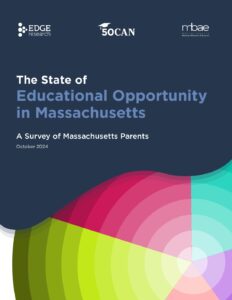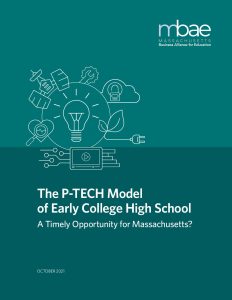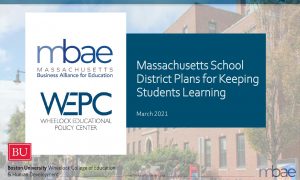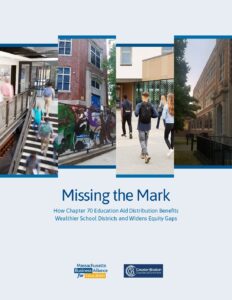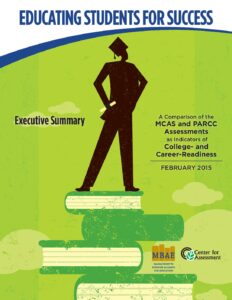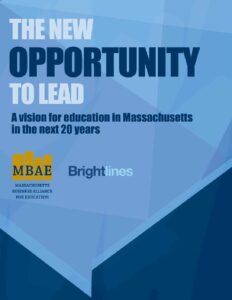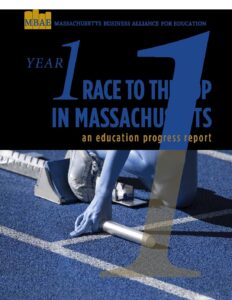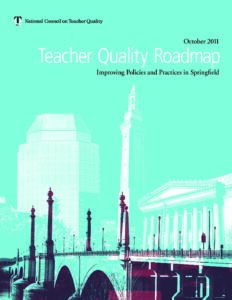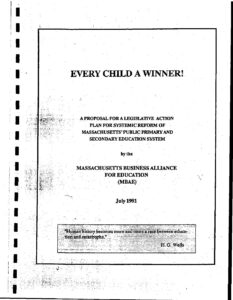Research and Reports
The State of Educational Opportunity in Massachusetts: A Survey of Massachusetts Parents
This survey of parents on the state of education opportunity in Massachusetts, produced in partnership with 50CAN and Edge Research, provides not only a unique window into the opportunities available to students in Massachusetts but allows us to compare those answers to parents across our region and across the country. The survey is organized into five categories of learning that families tell us are crucial for them and their children: 1) school quality and opportunity, 2) tutoring, summer and mental health, 3) out of school activities, 4) information and engagement, and 5) college and career readiness. A total of 410 parents and guardians of school-aged children in our state were surveyed between July 8 and August 22, 2024, as part of a nationwide research effort that reached more than 20,000 respondents.
JANUARY 2025
High-Dosage Tutoring: A High-Impact Literacy Strategy
Reading by third grade is a pivotal benchmark. Yet just 42% of Massachusetts’ third graders were proficient in reading on the 2024 MCAS exams, and 76% of low-income students didn’t meet the state’s proficiency bar. This MBAE report reviews research on the efficacy of high-dosage tutoring and summarizes the findings of a new Johns Hopkins University analysis of the impact of a first-grade early literacy high-dosage tutoring pilot in Massachusetts. The report recommends a significant state expansion of the model.
DECEMBER 2024
Accelerating Student Learning: The Need for Urgency and Innovation
The pandemic has had a deeply negative effect on learning across Massachusetts for all students—regardless of racial/ethnic background, family income, or other factors. In certain communities, the percentage of students experiencing significant learning loss is quite large. We must take bold and urgent action to accelerate learning and put students on a path to academic recovery. In this paper, MBAE and the Massachusetts Competitive Partnership revisit and build upon recommendations we made in our 2020 report on pandemic learning loss, and highlight practices and initiatives that evidence shows work.
DECEMBER 2023
Lifting Our Communities: Building Education Pathways to Economic Opportunity for All
OCTOBER 2023
MBAE partnered with Latinos for Education and Education Trust in Massachusetts on this report that examines and highlights systemic educational inequities, primarily affecting Black and Latino students, that result in unequal representation in higher education and careers in high-paying, high-growth industries. To better understand the lived experiences of Black and Latino high school students, we conducted a series of interviews with students and leaders of color across Massachusetts. The paper centers on key themes that emerged from those conversations: asset-based guidance and career counseling; expanded access to rigorous pathway programs and advanced course offerings; relatable, diverse educators and school leaders; meaningful and inclusive work-based learning opportunities; and, community resources.
OCTOBER 2023
Tapping the Power of Health Pathways in Early College High Schools
MBAE partnered with MassINC on this paper that presents strategies to build pathways that allow students to explore their interests in clinical professions and provide a firmer and faster course through post-secondary studies and into medicine, nursing, and allied health careers. It draws from conversations with more than two dozen leaders in health care, higher education, Early College, and workforce development.
MAY 2023
Expanding Access to and Participation in Computer Science in Massachusetts: A State Level Strategy
In the 2020–2021 school year, just 5.8% of Massachusetts high school students were enrolled in a computer science course, urban schools were less likely to offer computer science than suburban and rural schools, and only 28.4% of students enrolled in a computer science course were female. Computer science is a critical area of study that can create pathways to good jobs that pay family-sustaining wages. Read our report to find a state level strategy to ensure equitable student access to computer science classes and to dramatically increase enrollment, particularly among students traditionally underserved and underrepresented in key sectors of our economy.
MARCH 2023
High School Redesign: Building Stronger Pathways to College and Career
As state leaders seek to strengthen the Commonwealth’s economic competitiveness, ensure greater equity of opportunity for all students, and close wage and wealth gaps, a key focus should be on programs that provide pathways for high school students to earn the credits and credentials that qualify them for in-demand jobs and position them for post-graduate success. Building on our 2008 report, Educating a 21st Century Workforce, our 2014 report, The New Opportunity to Lead, and three leading reports from the last couple of years that represent the field’s latest thinking on best practices in the high school redesign and pathways space, this report outlines a series of steps that the Commonwealth can take to positively transform our state’s high schools to the benefit of Massachusetts’s students.
JUNE 2022
The P-TECH Model of Early College High School: A Timely Opportunity for Massachusetts?
P-TECH is a pioneering high school model that stands out as an effective strategy to better prepare students for workforce opportunities in STEM, and to build a diverse, highly skilled workforce pipeline. There are more than 127 P-TECH high schools operating in ten states, but none are located here in Massachusetts. Many have been launched in low-income communities with large populations of students of color to accelerate access to STEM careers from historically underserved communities. Read our paper to learn more about the history of P-TECH, results to date, the role of key stakeholders in launching and sustaining a P-TECH initiative, and why the time is right for Massachusetts to embrace P-TECH.
OCTOBER 2021
Seizing the Moment: Leveraging Federal ARPA Funding to Enable Student Recovery and Promote Innovation in K-12 Education
This MBAE paper calls for using the extraordinary federal relief funding to build a stronger, more equitable, more aligned education system than before the pandemic and includes policy recommendations and steps the state and districts can take to promote the transformational changes needed to deliver for students.
SEPTEMBER 2021
Analysis of District/Teacher Contracts Negotiated During the Pandemic
Read our analysis of 2020/2021 Memoranda of Understanding (MOU) negotiated between school districts and teachers’ unions during the pandemic that shows how MOUs shifted and adapted educator work rules to respond to the COVID-19 pandemic. It finds that MOUs focused mainly on maintaining as much normalcy in work rules as possible rather than anticipating or seeking to address the challenges remote and hybrid learning presented for students. The second part of the report examines the implications of our findings for services to students in the coming years. Many students will require enhanced social, emotional, and academic support. We examine five strategies for supporting student recovery frequently cited by education experts and find that implementation of some of these will likely require significant amendments to CBAs, and that all strategies potentially involve some need for greater flexibility.
SEPTEMBER 2021
Summary Report from Our Review of District Strategies for 2020–21 School Year
Amid the largest disruption to Massachusetts schooling in living memory due to the COVID-19 pandemic, MBAE, in partnership with Boston University’s Wheelock College of Education & Human Development, set out to ask: “How well prepared are Massachusetts school districts to keep students learning during these unprecedented times?” Read the summary report findings of our review of districts’ teaching and learning plans for the 2020–21 school year when districts were operating remote or hybrid due to the COVID-19 pandemic.
APRIL 2021
Choosing a Return to Better: Moving Beyond Normal in the Return to School and Learning
In November 2020, MBAE joined with the Massachusetts Competitive Partnership to support an effort to leverage the disruptions caused by the pandemic to rethink teaching and learning to set students on a trajectory that the status quo never could. The report recommends a focus on closing the digital equity gap, prioritizing college and career readiness, and promoting innovation and flexibility in our schools to minimize the impact of school disruptions, move student learning forward, and promote continuous innovations that serve students well beyond the pandemic.
NOVEMBER 2020
School District Continuity of Learning Plan Comparison Tool
This database, published in November 2020, captured information about how Massachusetts school districts planned to meet students’ needs and move learning forward during disruptions from the pandemic in the FY 2020-21 school year. It tracked information including whether districts required a minimum number of synchronous instructional minutes, had plans to address social-emotional learning, prioritized different categories of students for in-person learning, and planned to administer diagnostic tests to measure learning loss among other plan components. MBAE partnered on the project with Boston University Wheelock College of Education & Human Development, who conducted the research under MBAE’s guidance.
NOVEMBER 2020
Missing the Mark: How Chapter 70 Education Aid Distribution Benefits Wealthier School Districts and Widens Gaps
This analysis of state education aid distribution by MBAE and the Greater Boston Chamber of Commerce shows Massachusetts distributes more aid to wealthier school districts than the state formula determines they need at the expense of increasing resources to low-income communities. The report finds that $778 million in the fiscal year 2021 budget proposal, or 14% of the total annual state Chapter 70 appropriation to aid public schools, would go to districts regardless of their ability to fund K–12 education on their own. Much of that total, almost $500 million a year, would go to the wealthiest 20% of school districts in Massachusetts.
School Level Funding Analysis and Searchable Database
This June 2019 MBAE analysis of school-level funding data shows schools that serve similar student populations and spend the same amount per student can achieve dramatically different results with respect to student performance. The analysis also shows that although the state allocates more money for high-need students, within some districts, schools serving higher percentages of economically disadvantaged students are spending less per student than schools within the same district serving fewer disadvantaged students.
JUNE 2019
Educating Students for Success: A Comparison of the MCAS and PARCC Assessments as Indicators of College and Career Readiness
MBAE commissioned this study in 2015 as the state debated whether or not to continue using the old MCAS test or move to a new and evolving assessment known as PARCC (Partnership for Assessment of Readiness for College and Careers). The state ultimately decided to update the MCAS in ways that were consistent with MBAE’s call for a greater focus on college- and career-readiness standards.
FEBRUARY 2015
The New Opportunity to Lead: A Vision for Education in Massachusetts for the Next 20 Years
This comprehensive assessment of the Commonwealth’s education system conducted by international education experts and released by MBAE in March 2014, sounded the alarm that student achievement had leveled off and the state risks falling behind global competitors who are outpacing the Commonwealth in educating a highly skilled workforce and informed, engaged citizens. The report provides a blueprint for modernizing our elementary and secondary education system.
Year One Race to the Top in Massachusetts: A Progress Report
In 2011, one year after Massachusetts was awarded a $250 million federal Race to the Top grant that required implementation of far-reaching and some controversial policies, MBAE commissioned this report to examine progress on several key initiatives, including implementation of the Common Core State Standards and a new evaluation system for teachers and administrators. It outlines the successes and challenges of Massachusetts’ first year of Race to the Top.
NOVEMBER 2011
Teacher Quality Roadmap: Improving Policies and Practices in Springfield MA
In 2011, one year after Massachusetts was awarded a $250 million federal Race to the Top grant that required implementation of far-reaching and some controversial policies, MBAE commissioned this report to examine progress on several key initiatives, including implementation of the Common Core State Standards and a new evaluation system for teachers and administrators. It outlines the successes and challenges of Massachusetts’ first year of Race to the Top.
OCTOBER 2011
School Funding Reality: A Bargain Not Kept
This 2010 study on school funding and spending trends in Massachusetts found that the explosive growth in the cost of school employee health insurance had crowded out funding for other portions of school budgets that directly impact students such as spending on books and other classroom materials as well as teacher training. This report was the catalyst for the establishment of the legislature’s Foundation Budget Review Commission and led to the passage of the 2019 Student Opportunity Act, legislation that nearly doubles the state funding that the poorest communities receive for each low-income student.
DECEMBER 2010
Analysis of the Commonwealth of Massachusetts State Standards and the Common Core State Standards for English Language Arts and Mathematics
This non-ideological, side-by-side comparison of the Common Core State Standards and Massachusetts’ then under development K-12 English and math standards found that Common Core not only draws heavily from Massachusetts standards but improves upon them by incorporating some of the best international standards. The researchers found there is substantial alignment between the two sets of standards in terms of rigor and whether they are clear and measurable. One key improvement the report identified is a stronger emphasis on strategic thinking and less on recall in the Common Core standards, and the introduction of these skills in earlier grades.
JULY 2010
Human Capital in Boston Public Schools: Rethinking How to Attract, Develop and Retain Effective Teachers
This MBAE and National Council on Teacher Quality (NCTQ) report on Boston Public School policies that have an impact on teacher quality, concludes that while the district has many smart, strategic policies in place, improving teacher rules could help the district do more to attract and retain effective teachers.
FEBRUARY 2010
Educating a 21st Century Workforce: A Call for Action on High School Reform
Released in 2008, this report includes a plan of action created by a commission of employers convened by MBAE. The commission found that meeting the challenge of preparing all students for college and career will require changes in the way high schools are structured because, “like it or not, students are acting like consumers,” disengaging from schools when they fail to see connections between what is being taught in the classroom and their own goals and postsecondary plans.
OCTOBER 2008
Preparing for the Future: Employer Perspectives on Work Readiness Skills
For this report, released in 2006, MBAE examined existing information about employer-driven definitions of key standards for high school graduates in the areas of basic academic skills, technical skills, and work readiness skills and conducted focus groups with Massachusetts employers. The findings were used to inform educators and policy-makers about the work readiness skills that employers expect of Massachusetts high school graduates and describe the skills and characteristics that corporations require for entry-level positions with potential for growth and advancement.
OCTOBER 2006
Every Child a Winner
In 1991, MBAE proposed this detailed reform plan as the basis for what would ultimately become the 1993 Massachusetts Education Reform Act. In it, MBAE calls for high standards, accountability for performance, and equitable distribution of resources among school districts. This “grand bargain” has been credited with driving the improvements in student achievement that elevated Massachusetts to the top on most measures of student performance.

